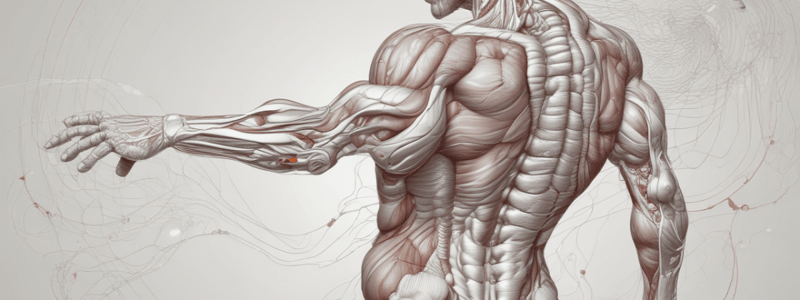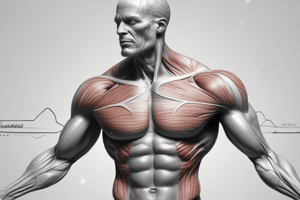Podcast
Questions and Answers
What is required to stimulate a skeletal muscle contraction?
What is required to stimulate a skeletal muscle contraction?
What is the function of the motor neuron in muscle contraction?
What is the function of the motor neuron in muscle contraction?
What is the role of acetylcholine in muscle contraction?
What is the role of acetylcholine in muscle contraction?
What is the all or none law in muscle contraction?
What is the all or none law in muscle contraction?
Signup and view all the answers
What is the result of an action potential in a muscle fibre?
What is the result of an action potential in a muscle fibre?
Signup and view all the answers
What is the location where the nerve impulse is initiated?
What is the location where the nerve impulse is initiated?
Signup and view all the answers
Study Notes
Stimulation of Muscle Contraction
- A skeletal muscle contraction is initiated by a nerve impulse.
- The nerve impulse travels down a motor neuron.
- The motor neuron releases the neurotransmitter acetylcholine at the neuromuscular junction.
- Acetylcholine binds to receptors on the muscle fiber's membrane.
- This binding triggers an action potential in the muscle fiber.
Role of the Motor Neuron
- The motor neuron is responsible for transmitting the signal from the nervous system to the muscle.
- The motor neuron releases acetylcholine at the neuromuscular junction, which initiates the muscle contraction.
Role of Acetylcholine
- Acetylcholine is the neurotransmitter responsible for triggering muscle contraction.
- It is released by the motor neuron at the neuromuscular junction.
- Acetylcholine binds to receptors on the muscle fiber membrane, initiating an action potential.
The All-or-None Law
- The all-or-none law states that a muscle fiber will contract completely if the stimulus reaches the threshold, or not at all if it does not.
- The strength of the stimulus does not affect the strength of the contraction, only whether it occurs or not.
Result of an Action Potential
- An action potential in a muscle fiber initiates the sliding filament mechanism.
- This mechanism involves the interaction of actin and myosin filaments, which ultimately causes the muscle fiber to shorten and contract.
Location of Nerve Impulse Initiation
- Nerve impulses originate at the axon hillock, which is a specialized region of the neuron where the axon joins the cell body.
- The axon hillock is responsible for integrating signals from the dendrites and cell body, and determining whether to fire an action potential.
Studying That Suits You
Use AI to generate personalized quizzes and flashcards to suit your learning preferences.
Related Documents
Description
Learn how skeletal muscles contract, including the role of motor neurons and nerve impulses in the process.




